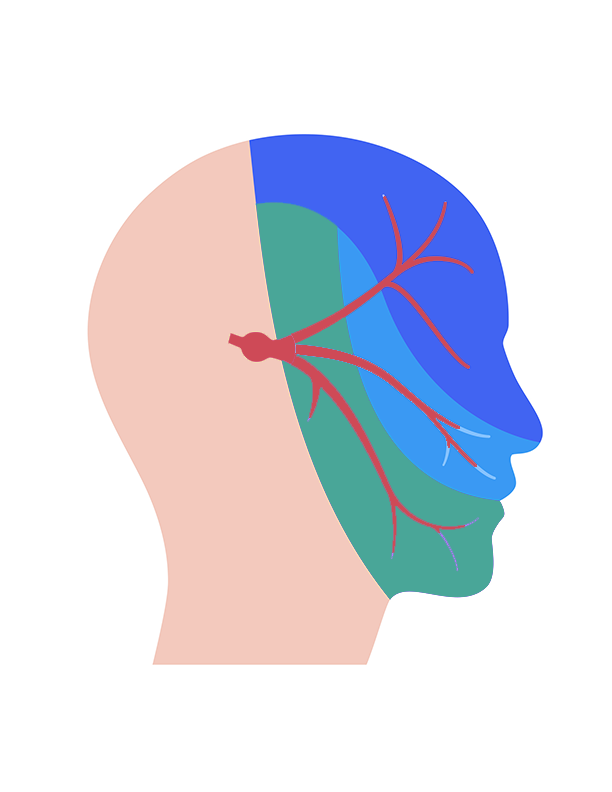Neuralgia
Neuralgias of the face can result in transient or constant pain in the areas supplied by the various facial peripheral nerves.


What is Neuralgia?
Peripheral nerves extend throughout the body. When a peripheral nerve is damaged by injury or illness, it can affect the ability to feel and move. Facial neuralgia refers to pain conditions that affect the nerves of the face. The main types are:
- Trigeminal neuralgia, a chronic pain condition that affects the trigeminal nerve, which is one of the largest nerves in the head. It causes extreme, severe, electric shock-like pain in parts of the face supplied by branches of the trigeminal nerve. The pain is usually one-sided and can be triggered by chewing, talking, or even light brushing against the face. It comes in sudden attacks lasting from a few seconds to a few minutes.
- Occipital neuralgia, which involves inflammation or injury to the occipital nerves that run from the top of the spinal cord at the base of the skull up towards the scalp. It causes intense, severe, stabbing, or shock-like pain originating at the base of the skull and radiating over the back and top of the head. The pain may involve one or both sides of the head. Certain head movements can trigger pain attacks.
- Peripheral neuropathy of the face, which refers to damage or disease affecting the peripheral nerves that provide sensation and motor function to the face. It causes symptoms like numbness, tingling, burning pain, or muscle weakness in the areas of the face supplied by the affected nerves. Peripheral neuropathy of the face can result from trauma, compression, metabolic disorders like diabetes, or other neurological conditions.
- Post-herpetic neuralgia, which is a complication that can occur in some cases after having shingles (herpes zoster viral infection). If the shingles outbreak affects nerves in the face, some patients may develop persistent, chronic nerve pain in the same facial area even after the shingles rash has healed. The pain, described as burning, stabbing, or shooting, is caused by nerve damage from the viral infection. It can last months or even years in some cases.
What are some common causes of Neuralgia?
- Compression or entrapment of the nerve
- Trauma or injury to the nerve
- Injuries like skull fractures, lacerations, or dental procedures that damage nerves
- Post-surgical complications with nerve damage
- Viral infections like herpes zoster (shingles), leading to postherpetic neuralgia
- Bacterial or fungal infections that inflame nerves
- Multiple sclerosis
- Diabetes
- Cancer (tumors can compress nerves directly, or cancer treatments may damage nerves)
- Stroke
- Hypothyroidism
- Nutrient deficiencies
Conservative Treatments for Neuralgia
- Medications: Anti-seizure medications like gabapentin, pregabalin, and carbamazepine are commonly used to treat neuralgia by reducing nerve irritability. Tricyclic antidepressants like amitriptyline can help relieve neuropathic pain. Over-the-counter pain medications like NSAIDs can help mild cases.
- Topical creams: Topical medications containing ingredients like lidocaine may provide temporary relief by numbing nerve pain.
- Hot or cold therapy: Applying heat or cold packs to the area may temporarily relieve pain during flare-ups.
- Vitamin therapy: Supplements like B vitamins, alpha-lipoic acid, or others may be recommended if deficiencies are suspected as contributing factors.
- Lifestyle modifications: Stress reduction techniques like meditation, yoga, and biofeedback can help, as well as maintaining good sleep, nutrition, and exercise habits and avoiding known triggers like chewing hard foods for trigeminal neuralgia.

Advanced Treatments for Neuraligia
- Nerve blocks: Injections of corticosteroids and anesthetics around the affected nerve can provide diagnostic information and therapeutic pain relief that may last weeks to months.
- Neuromodulation: This can play an important role in treating certain types of neuralgia (nerve pain disorders). Peripheral Nerve Stimulation (PNS) involves implanting a device that delivers electrical impulses to the specific peripheral nerve affected by the neuralgia, disrupting and modulating the pain signals.
- Surgery: Surgery is sometimes considered for certain types of neuralgia when conservative treatments have failed to provide adequate relief. Some of the surgical options include neurectomy, nerve decompression, and more.

Complementary Treatments for Neuralgia
- Acupuncture: This may help some patients by stimulating nerves and releasing pain-relieving substances.
- Massage therapy: Getting a massage can increase circulation and release any muscle tension that’s contributing to nerve compression.
- Transcutaneous Electrical Nerve Stimulation (TENS): This therapy delivers low-voltage electrical currents through electrodes on the skin to interfere with pain signals.
Why choose
Synergy Health Partners?
Synergy Health Partners is Michigan’s sole integrated musculoskeletal care provider. We offer a comprehensive suite of services, including orthopedic urgent care, in-office treatments, ambulatory surgery centers, virtual consultations, and an in-house pharmacy. Our coordinated approach ensures seamless, personalized care for your musculoskeletal well-being.

Find a Doctor
Synergy Health Partners brings together doctors with specialized expertise in musculoskeletal care. Our physicians are affiliated with Michigan’s top hospitals and stay up-to-date on the latest technologies and treatments, both surgical and non-invasive, to provide patients with advanced, proven medical care.
Frequently Asked Questions
What is neuralgia?
Neuralgia refers to severe, shooting pain caused by injury or dysfunction of a nerve. It often comes in sudden attacks or outbreaks of intense, stabbing pain.
What are the main types of neuralgia?
The most common forms are trigeminal neuralgia (affecting the trigeminal nerve in the face), occipital neuralgia (occipital nerves at the back of the head), and postherpetic neuralgia (after a shingles outbreak).
What causes neuralgia?
Common causes include compression of the nerve, trauma/injury, viral infections like shingles, diseases like multiple sclerosis, and sometimes an unknown idiopathic cause.
What does neuralgia feel like?
The pain is described as severe, stabbing, shooting, electric shock-like sensations along the course of the affected nerve. Even a light touch can trigger intense pain attacks.
How is neuralgia diagnosed?
Diagnosis involves taking a medical history, a physical exam to identify any trigger points, and sometimes imaging tests like MRI to check for any structural causes.
How is neuralgia treated?
Treatment may involve medications (anticonvulsants, antidepressants), interventional procedures like nerve blocks, complementary therapies, and sometimes surgery as a last resort.
Can neuralgia be cured permanently?
There is no permanent cure, but treatments aim to provide optimal pain management and reduce the frequency/severity of attacks as much as possible.
What self-care helps neuralgia?
Avoiding known triggers, applying heat/cold, massage, relaxation techniques, proper nutrition, and getting adequate sleep can provide some relief.
Break Free From the Pain of Neuralgia
Suffering from intense, stabbing nerve pain? Reach out to discuss our comprehensive treatment options to help patients find relief from neuralgia.
